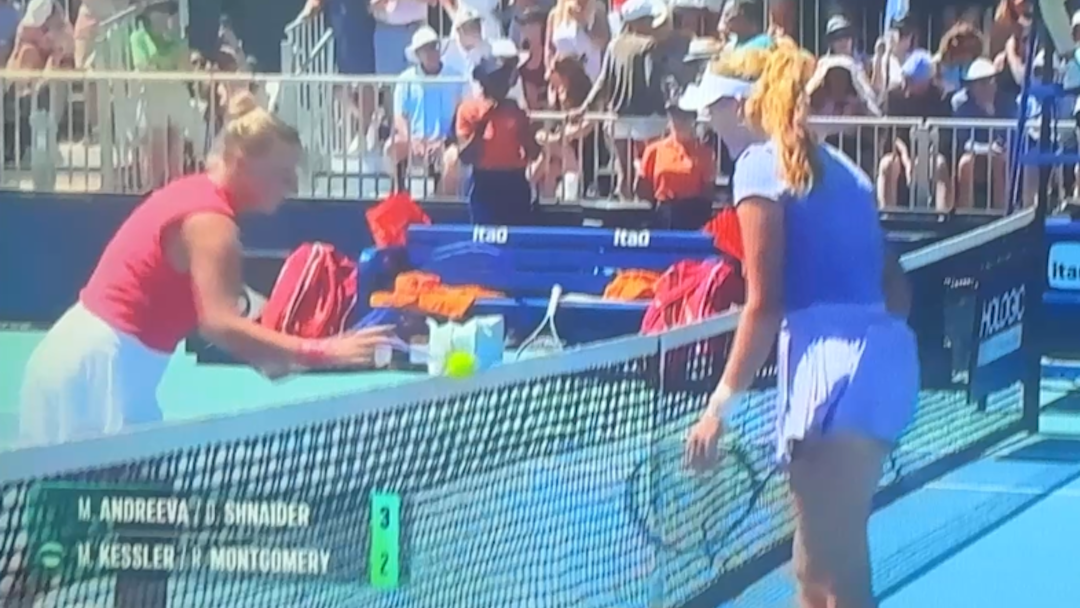Fiend at Court Unplugged
Ben Rothenberg of the No Challenges Remaining podcast once placed Anna Kournikova on his list of the top 10 most important women in tennis history. At the time, he was fully aware that her inclusion was controversial and would not be universally accepted. Always articulate, Rothenberg re-emphasized that the title of the list was “most important” and not “best.” It has been a couple of years since that episode of the NCR published. In the intervening time, I have come around to Rothenberg’s point. Kournikova revolutionized the marketing of women’s professional tennis.
Kournikova was 14 when she turned pro in 1995 and was only 22 when she retired from competition in 2003. During that time she totaled $3.5 million in prize money. Not bad. At the same time she was estimated to be earning $10 million per year in endorsements. In fact both her fellow players and public detractors will point out that her on-court performance never justified those levels of compensation.
While female tennis players had certainly been objectified long before Kournikova broke onto the scene, she was one of the first to aggressively embrace her marketability. In 2000, Forbes ran an article on Kournikova which acknowledged that her ranking was only 9th in world and that she had yet to win a singles title. (In fact, she never did.) However, she was winning Internet in a landslide. Data from the search engines of that era showed that she was the most searched for female athlete ever. To lift a phrase from that same Forbe’s article, “Over 18,000 Web pages are devoted to her backhand and her back end.”
The modern tennis coaching perspective on Kournikova is that the early endorsement deals may have stunted her competitive career. She played way too many exhibitions and did not spend enough time working to improve her game. Agents today would likely advise her to limit her exposure and focus on the tennis.
In a more recent episode of NCR, author Jon Wertheim made the point that the WTA didn’t want Kournikova to play smaller tournaments that she arguably would have won. Her publicity power was too great to waste on smaller events. Had she played mid-tier WTA tournaments she likely would have grasped the singles success that eluded her. You have to win once to have a track record of success to build on.
Wertheim also indicated that when he interviewed Kournikova in 2000 for his book Venus Envy, he gave her every opportunity to claim that she had been explored by others seeking publicity. According to Wertheim, Kournikova never blamed others for her publicity decisions and actions. Wertheim summarized her attitude with the statement that she always indicated that she was the one cashing the checks. I love the fact that she accepts ownership and responsibility for those aspects of her career.
Kournikova changed the way women’s tennis was sold to the public. She ushered in an era where it was OK to market tennis based on sex appeal. Additionally, she revealed that the public had an appetite for women’s tennis. Maybe for the wrong reasons, but she build buzz and excitement around the tour. While her own endorsement contracts will always be outliers when compared to her performance, Kournikova showed the world that women’s professional tennis could be highly profitable. She revolutionized how women’s tennis is promoted. Consequently, I have also grown to regard her as an important brick in the road to advancing toward equitable prize money.
I wanted to end on a lighter note that illustrated the extent of her reach in popular culture. Talk show host David Letterman had a running gag on his show called the “Anna Kournikova Play of The Day.” It would be a short clip of her doing something mundane, such as drinking from a water bottle. The internet has let me down on this one, and I failed to locate a clip of the Letterman gag.
As a fallback position, I am closing this post with one of my favorite tennis commercials of all time which featured Kournikova and Mary Jo Fernandez. The joke at the time is that Kournikova exhibits unexpected financial agency and acumen in the commercial. In retrospect, the joke was on us. It is the way she was all along.
- The 10 Most Important Women in Tennis History, No Challenges Remaining Podcast, Episode 224, February 12, 2019.
- New Stars of Money: Anna Kournikova attacks the Net, Forbes, March 20, 2000.
- Anna Kournikova: How a ‘marketing monster’ seduced the world, Sheena McKenzie, CNN, November 27, 2015
- NCR Book Club Author Chat – Jon Wertheim, No Challenges Remaining Podcast, Episode 251b, April 3, 2020.



